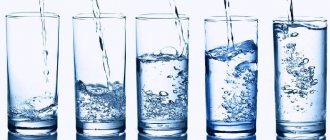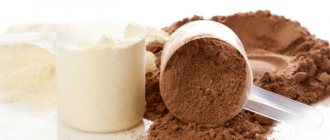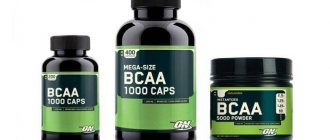What are amino acids?
In this article we will talk about Amino Acids.
All cells in the human body, including muscles, are made of protein. Protein is formed from a set of amino acids. Thus, amino acids are called the building material for proteins in the human body. They help the formation of muscles, ligaments, tendons. Healthy skin and hair are also their merit. It is from amino acids that our body builds new cells and restores all damaged tissues. Amino acids also help strengthen the body and promote the production of various hormones, antibodies and enzymes.
These organic compounds have the structure of multicomponent chains. In the stomach, these chains break down under the action of enzymes. In this form, amino acids are absorbed by the small intestine and enter the liver. In the liver they are distributed according to their destination. For example, the synthesis of hormones or maintaining immunity.
At the moment, there are 20 amino acids that make up protein. Everyone has their own role. So, looking at your lifestyle or type of activity, you can determine which amino acids you need more and which ones less.
A clear mind and strong nerves.
As we already know, our entire body consists of protein. And nerve cells are no exception. Brain activity and memory processes are ensured by hormones, which also consist of proteins. In addition, proteins help the brain absorb energy.
Studies have shown that nerve and brain cells that receive sufficient nutrition produce only pleasant emotions. For example, such as joy, spirituality, warmth in relationships, etc. Exhaustion of the nervous system, on the contrary, leads to insomnia, depression, absent-mindedness, feelings of despair, depression and fatigue.
The amino acids glycine, tryptophan, and theanine are especially important for the functioning of the brain and nervous system as a whole.
Glycine.
Glycine - probably everyone knows this amino acid. It is partially synthesized in our body, and also comes from outside with food. Glycine is an essential component of the cell membranes of nerve fibers and the brain. It improves nutrition and normalizes metabolism, strengthens the walls of blood vessels in these cellular structures. Its deficiency increases blood pressure, psycho-emotional stress, aggression, disrupts sleep and reduces performance.
The World Health Organization does not have data on the proven effectiveness or clinical significance of glycine. However, in Russia it is widely used. Manufacturers of pharmacological preparations of glycine claim that it has a calming, anti-anxiety and nootropic effect.
Glycine normalizes the processes of excitation and inhibition in the cerebral cortex, thus reducing a person’s aggressiveness and conflict and increasing his social adaptation. In addition, this amino acid increases mental performance, improves memory and associative processes, normalizes sleep and makes it easier to fall asleep.
Foods that contain glycine: fish, meat, dairy products, cheese, beans, eggs, spinach, pumpkin seeds, peanuts, pistachios, walnuts and pine nuts.
Tryptophan.
Tryptophan is converted in the body to serotonin - the “hormone of joy”, which normalizes the activity of the nervous system and is a natural antidepressant. Tryptophan calms the nervous system, improves mood and improves sleep quality.
The thing is that with the regular intake of tryptophan, the necessary level of serotonin is maintained in our body. And this happens during the daytime. But in the dark (in the absence of lighting), melatonin is formed from serotonin - the “sleep hormone”. It is melatonin that ensures good quality sleep, allowing you to get a good night's sleep and rest in a shorter time.
Thus, tryptophan is an amino acid, thanks to which the “joy hormone” is produced during the daytime, and the “sleep hormone” at night.
Products that contain tryptophan: red and black caviar, Dutch cheese, peanuts, almonds, cashews, pine nuts, rabbit and turkey meat, squid, salmon, cod, eggs, fat cottage cheese, chocolate.
In addition, pharmacies sell a large number of biologically active supplements, which include tryptophan: “Tryptophan Formula for Restful Sleep” from the company Evalar, Motherwort with tryptophan, etc.
Theanine.
The amino acid L-tannin is of particular interest. It is theanine that works as an activator of brain activity. However, it does not cause excitability of the nervous system. Tannin, on the contrary, allows you to maintain calm, clarity of mind and normalize blood pressure that has risen due to stress.
Tannin awakens business activity and mental performance, improves memory and gives creative energy. Theanine is a real brain dope. There are many clinical experiments conducted by the Japanese that this amino acid is not only effective, but also safe, as it is isolated from green tea leaves.
The amino acid theanine is found in green tea, camellia sinensis and common, and Polish mushroom. However, according to research, its optimal dosage that works should be at least 500 mg. And in a regular cup of green tea it contains only 10-20 mg, which is very little and the desired therapeutic effect simply will not happen. You can get tannin in a dosage of 500 mg only from medications sold in pharmacies. For example, a dietary supplement from
Replaceable
Nonessential amino acids usually enter the body through food or are produced independently.
| View | Role |
| Alanin | Regulates blood sugar. If there is a deficiency, the body extracts amino acids from the muscles. This means it is important to keep them focused. |
| Asparagine | Supports immune function. Reduces the amount of ammonia in muscle tissue after prolonged physical activity. |
| Glycine | Helps produce essential amino acids, creatine. Deficiency leads to fatigue. |
| Glutamine | During active motor activity, this amino acid is activated. Takes part in metabolism. |
| Ornithine | Starts metabolism and breaks down fat. |
| Proline | Forms connective tissue and creates collagen. Used as an additional source of energy. |
| Serin | Ensures normal functioning of the nervous system. Plays a role in the body obtaining energy. Lack of serine manifests itself in the form of impaired attention and memory |
| Taurine | Increases physical activity and helps to cheer up. |
| Cysteine | It is an important component in hair growth and cleansing the body. |
| Citrulline | Helps remove ammonia and has an important role in protein metabolism. |
Amino acids
Valin (Val, V)
A little history
Most amino acids were discovered during the second half of the twentieth century during the search for new antibiotics from fungi, seeds, fruits and animal fluids. The first amino acid, asparagine, was discovered in 1806. It was isolated from asparagus juice by the French chemist Louis-Nicolas Vauquelin and assistant Pierre Jean Robiquet. A little later, leucine was obtained from cheese and cottage cheese.
What are amino acids
From a biochemical point of view, amino acids are organic substances consisting of a carbon skeleton, an amine and a carboxyl group. Thanks to the last two radicals, amino acids have the unique ability to exhibit the properties of both acids and alkalis.
Proteins make up 20% of the human body; they take part in all biochemical processes, and amino acids are the “building material” for them. The cells and tissues of the human body are composed primarily of amino acids, the key role of which is the transport and storage of nutrients.
Amino acids are vital for the body; without them, the synthesis of hormones, pigments, vitamins and purines is impossible. Not all amino acids can be synthesized by the human body, unlike some microorganisms and plants; they must be obtained from food.
Today, there are about 500 amino acids known to occur in nature. But only 20 of them are so-called standard proteinogenic amino acids. They, in fact, make up a polypeptide chain containing the genetic code.
Table. Standard Proteinogenic Amino Acids
| Amino acid | Abbreviation | Source |
| Glycine | Gly,G | Gelatin |
| Leucine | Leu, L | Muscle fibers |
| Tyrosine | Tyr, Y | Casein |
| Serin | Ser, S | Silk |
| Glutamic acid | Glu, E | Plant proteins |
| Glutamine | Gln, Q | |
| Aspartic acid | Asp,D | Conglutin, legumin (asparagus sprouts) |
| Asparagine | Asn, N | Asparagus juice |
| Phenylalanine | Phe, F | Lupine sprouts |
| Alanin | Ala, A | Silk fibroin |
| Lysine | Lys, K | Casein |
| Arginine | Arg, R | Horn substance |
| Histidine | His, H | Sturin, histones |
| Cysteine | Cys,C | Horn substance |
| Valin | Val, V | Casein |
| Proline | Pro, P | Casein |
| Hydroxyproline | Hyp, hP | Gelatin |
| Tryptophan | Trp,W | Casein |
| Isoleucine | Ile, I | Fibrin |
| Methionine | Met, M | Casein |
| Threonine | Thr, T | Oat proteins |
| Hydroxylysine | Hyl, h.K. | Fish proteins |
There are several ways to classify amino acids, the most popular is classification according to the method of synthesis. According to it, amino acids are divided into two types:
- Essential amino acids are amino acids that are not synthesized in the human body;
- Replaceable - those that the human body is capable of reproducing on its own.
Replaceable and essential amino acids
The following amino acids are essential but essential for the human body: alanine, asparagine, aspartate, glycine, glutamine, glutamate, proline, serine, tyrosine, cysteine, hydroxyproline, hydroxylysine.
Essential amino acids are those that cannot be synthesized independently in the human body and include: valine, isoleucine, leucine, lysine, methionine, threonine, tryptophan and phenylalanine, histidine, arginine. Arginine is also not synthesized in the child’s body, which is why it is also considered essential.
What foods contain amino acids
Amino acids are components of protein and, accordingly, it would be logical to assume that they are contained specifically in protein products, and this is true. Large amounts of amino acids are found in eggs, dairy products, meat and fish. From products of plant origin you can also obtain amino acids essential for the body. Their content is high in soybeans, lentils, beans and other legumes. Nuts and seeds contain high amounts of histidine, arginine and lysine, and grains contain leucine, valine and isoleucine.
Below is a table that shows which foods you can get essential amino acids from and their role in the body.
Table. Foods containing essential amino acids
| Name | What products contain | Role in the body |
| Leucine | Nuts, oats, fish, eggs, chicken, lentils | Reduces blood sugar |
| Isoleucine | Chickpeas, lentils, cashews, meat, soy, fish, eggs, liver, almonds, meat | Restores muscle tissue |
| Lysine | Amaranth, wheat, fish, meat, most dairy products | Takes part in calcium absorption |
| Valin | Peanuts, mushrooms, meat, legumes, dairy products, many grains | Takes part in nitrogen metabolic processes |
| Phenylalanine | Beef, nuts, cottage cheese, milk, fish, eggs, various legumes | Memory improvement |
| Threonine | Eggs, nuts, beans, dairy products | Synthesizes collagen |
| Methionine | Beans, soybeans, eggs, meat, fish, legumes, lentils | Takes part in radiation protection |
| Tryptophan | Sesame, oats, legumes, peanuts, pine nuts, most dairy products, chicken, turkey, meat, fish, dried dates | Improves and deepens sleep |
| Histidine (partially replaceable) | Lentils, soybeans, peanuts, tuna, salmon, beef and chicken, pork tenderloin | Takes part in anti-inflammatory reactions |
| Arginine (partially replaceable) | Yogurt, sesame, pumpkin seeds, Swiss cheese, beef, pork, peanuts | Promotes growth and repair of body tissues |
You can find out more about each amino acid by going to its page.
Our body needs amino acids every day and, according to biological research, the daily protein intake is from 0.5 to 2 grams per day per 1 kilogram of weight. Protein from different foods is absorbed by the body differently. It is believed that protein obtained from eggs, cottage cheese and fish is best absorbed.
Amino acids in the human body
The human body consists of 20% protein - it is the main building material for muscle tissue, all organs and cells. Protein is our skin and hair, blood cells, muscles and all other systems.
Amino acids, in turn, are the building blocks of protein. Essentially, we can say that protein (protein) is made up of amino acids.
In the human body, amino acids perform essential functions: they take part in the synthesis of hormones, pigments and vitamins, and play a key role in the transport and storage of nutrients.
Here is a list of just a few of the most important functions of amino acids in the body:
- First of all, amino acids are needed for the formation of protein, which is part of the muscle tissue of ligaments and tendons.
- Amino acids optimize recovery processes and accelerate the healing of skin damage.
- Amino acids are very important for the normal functioning of the brain and nervous system.
- Amino acids also play an important role in the formation of enzymes.
- Without amino acids, normal quality sleep is impossible.
- And finally, amino acids affect the health of hair, nails and skin.
From all of the above points, it is clear that amino acids are necessary for humans and they need to be received in abundance for the normal functioning of all body systems. Below we will look at what happens when there is a lack of amino acids, their excess, and from what foods you can get essential amino acids.
Deficiency and excess of amino acids
Our body is designed in such a way that everything should be in harmony and balance. Therefore, negative consequences occur both with a lack of amino acids and with their excess. Each amino acid performs its own function in the body, it has its own tasks, and accordingly, it often happens that the body lacks not all amino acids, but only a few; to identify the deficiency, there is a special blood test. You will also need to take a blood test to check for vitamin deficiencies, because amino acids are soluble and in our body they interact with vitamins B, , and.
When there is a lack of amino acids, a person experiences the following symptoms:
- Weakness, drowsiness.
- Decreased appetite or complete loss of it.
- Hair loss, deterioration of skin condition.
- Delayed growth and development in children.
- Anemia.
- Decreased immunity, and as a result, low resistance to viruses and infections.
- An excess of amino acids, as well as a lack of them, leads to disruptions in the functioning of various body systems. As a rule, negative consequences from an excess of amino acids are possible only with a deficiency of selenium and a lack of vitamins A, E, C, B.
With an excess of amino acids in the body, the following problems may arise: dysfunction of the thyroid gland, hypertension (excess tyrosine), joint problems (excess histidine), early gray hair (excess histidine), and an increased risk of heart attacks and strokes (excess methionine).
Table. The use of amino acids and their dosage
| Amino acid | Application | Dosage (as a dietary supplement for athletes) | Overdose; Shortage |
| Histidine | Treats arthritis, nerve deafness, improves digestion, necessary for babies and children during growth | 8-10 mg per 1 kg of weight (minimum 1 g per day) | Mental disorders, anxiety, schizophrenia, stress; Unknown. |
| Lysine | Treats herpes, adds energy, promotes muscle protein production, fights fatigue, maintains nitrogen balance in the body, important for calcium absorption and retention, promotes collagen formation | 12 mg per 1 kg of weight | Increased cholesterol, diarrhea, gallstones; Impaired enzyme production, weight loss, decreased appetite, decreased concentration. |
| Phenylalanine | Treats depression, arthritis, nervous disorders, seizures, relieves muscle tension, important for the production of neurotransmitters serotonin and melatonin | 1 mg per 1 kg of weight | High blood pressure, migraines, nausea, disruption of the heart and nervous system. Not recommended for pregnant women and diabetics; Lethargy, weakness, growth retardation, liver dysfunction. |
| Methionine | Treatment of liver, arthritis, depression, accelerates fat metabolism and improves digestion, antioxidant, prevents the accumulation of excess fat in blood vessels and liver, removes toxins | 12 mg per 1 kg of weight | Possible with deficiency of B vitamins. Atherosclerosis; Fatty liver degeneration, growth retardation, lethargy, swelling, skin diseases. |
| Leucine | Prevents muscle wasting, natural anabolic agent, promotes wound healing and is important for growth hormone production | 16 mg per 1 kg of weight | Increases ammonia levels; Unknown. |
| Isoleucine | Heals wounds, releases growth hormone, regulates blood sugar, is important for the formation of hemoglobin, is responsible for muscle structure | 10-12 mg per 1 kg of weight | Causes frequent urination, use with caution if you have kidney or liver disease; Unknown. |
| Valin | Regulates nitrogen balance, restores and promotes muscle growth | 16 mg per 1 kg of weight | Skin tingling, hallucinations, prohibited for people with liver or kidney disease; Maple syrup disease. |
| Threonine | Important for the production of collagen, elastin, antibodies, maintains muscle health, stimulates growth, and is used to treat mental health | 8 mg per 1 kg of weight | Unknown; Irritability, weakened immunity. |
| Tryptophan | Important for the production of serotonin and melatonin, necessary during growth | 3.5 mg per 1 kg of weight | Dizziness, migraines, vomiting, diarrhea; May cause the development of tuberculosis, cancer, diabetes, and dementia. |
| Arginine | Responsible for muscle recovery, rapid healing of wounds and injuries, removes toxins, strengthens the immune system | 0.4 mg per 1 kg of weight | Diseases of the pancreas, liver; Decreased blood pressure, weakness, indigestion. |
People with genetic disorders in the process of assimilation of amino acids, vegetarians, bodybuilders and people who simply do not watch their diet are at risk.
Amino acids in sports nutrition
Additional amino acid supplementation has recently become very popular among athletes, especially bodybuilders. Without a sufficient amount of amino acids, muscle mass growth is impossible. The thing is that building muscle mass is a systematic process of microdamage to muscle fibers and their healing. And just for the healing of muscle fibers, protein is needed as a building material. In order to consume a sufficient amount of protein, an athlete needs to carefully think through his diet; in the modern pace of life, this is not always possible, and this is where protein and amino acid complexes (BCAAs) come to the rescue.
BCAA (from the English. Branched-chain amino acids) is a complex consisting of three essential amino acids:
- Leucine
- Isoleucine
- Valine
Leucine, isoleucine and valine make up 35% of all amino acids in muscle tissue and take part in the processes of anabolism and muscle recovery, and also have an anti-catabolic effect. BCAAs are essential amino acids and cannot be synthesized independently, so a person is forced to obtain them with food or special supplements in the form of capsules or powder. Once in the body, BCAAs are primarily metabolized in the muscles, and are a kind of “fuel” for the growth of muscle mass. This is how they differ from the other 17 amino acids. This property helps to significantly improve athletic performance and improves the athlete’s well-being after a long workout. BCAAs are safe for health if the dosage is not exceeded.
It should be noted that protein and amino acid complexes should be taken according to the instructions on the package, without exceeding the daily allowance.
To summarize, we can say with confidence that amino acids are what our body needs every day to maintain the normal functioning of all body systems. You can get them not only from animal products, but also from cereals, legumes and nuts. If a person eats well, does not engage in bodybuilding and does not have any genetic abnormalities, then he does not need additional intake of amino acids in powders and capsules.
Irreplaceable
Essential amino acids cannot be produced by the body on its own. To replenish their supply, it is necessary to eat food containing essential amino acids.
| View | Role | What does it contain? |
| Valin | Helps increase muscle mass. Promotes tolerance of high or low temperatures. | In various animal products (chicken, fish, rice and legumes) |
| Isoleucine | Stores energy in muscles. Preserves muscle mass and also produces hemoglobin. Helps restore damaged tissue. | Any type of meat, fish, eggs and nuts. |
| Leucine | Performs a protective function and is an important component of the immune system. Participates in reducing the period of protein breakdown and helps to recover from fractures. | Eggs, chicken, legumes, fish, soy |
| Lysine | Forms carnitine, helps muscles improve oxygen consumption. | Meat of any kind, milk, legumes. |
| Methionine | Restores the liver and kidneys. | Milk, eggs, soy products, meat, nuts. |
| Threonine | Filters the liver. | Nuts and eggs, milk. |
| Tryptophan | Controls appetite, sleep and fatigue. | Meat, bananas, dairy products. |
| Phenylalanine | Forms ligaments and cartilage. Reduces appetite. | Eggs, beef, nuts, dairy products. |
Essential amino acids
While all essential amino acids are in fact vital for gaining muscle mass and strength, recent research suggests that only the essential amino acids are required for muscle protein synthesis—some more important than others.
The three amino acids—valine, isoleucine, and leucine—are collectively known as branched-chain amino acids, so named because of their molecular structure, which has branched carbon chains extending from the primary carbon structure. BCAAs are unique because they are not metabolized in the liver, but in the muscles. That's why they are called muscle-building amino acids.
Leucine stands out for its more anabolic properties. When you see advertisements for supplements that claim to “overcome genetic limitations” and that show complex diagrams of protein synthesis, you're probably looking at pictures of BCAA molecules, especially leucine.
Some popular protein supplements, such as whey protein, are effective primarily due to their rich BCAA content, although other amino acids in whey, such as cysteine, offer significant health benefits.
Conditionally replaceable
Such organic substances can be produced only when necessary from essential amino acids. For this reason, in order to saturate the body with conditionally replaceable substances, you need to take special nutrition.
| View | Role | What does it contain? |
| Arginine | Thanks to these amino acids, muscle growth occurs. Cleanses the liver and stimulates the immune system. | Various cheeses, milk, meat. |
| Histidine | Affects the growth of muscle tissue and produces blood. | Soy, fish and pork |
| Tyrosine | Prevention of stress and depression. | Bananas, milk and nuts. |
| Cystine | Disinfects the body after taking tobacco products or alcohol. | Milk, cheeses, peas, meat, nuts and fish. |
Let's summarize the benefits of essential acids for the body
- What is an amino acid? There are many different ways to determine amino acid composition, but amino acids function as the building blocks of protein molecules and make up most of the cells and tissues in our body.
- They can be further broken down into nonessential and essential amino acids. The definition of essential amino acids includes any amino acid that the body cannot produce on its own. This means that the source of essential amino acids for the body is food. On the other hand, the formation of non-essential amino acids is carried out by our body and they are not necessary for consumption.
- How many essential amino acids are there in the human body? There are 9 essential amino acids - lysine, leucine, isoleucine, valine, tryptophan, phenylalanine, threonine, histidine and methionine.
- Arginine, alanine, cysteine, glutamate, aspartate, glycine, proline, serine, tyrosine, glutamine and asparagine are a list of essential amino acids.
- Essential amino acids help promote weight loss, maintain muscle mass, improve exercise, sleep and mood.
- To make sure you get the amino acids your body needs, you should eat a balanced, healthy diet. The diet should be rich in protein foods such as meat, fish, poultry, eggs, legumes, nuts and seeds.
What amino acids are best to take?
It is not always possible to fully saturate the body with the necessary amino acids. In such a situation, special nutritional supplements help.
However, among specialized nutrition you can find many fakes and ineffective products. It is very important to choose the right manufacturer. A time-tested, well-known product will help solve this problem.
Be sure to pay attention to the expiration date and quality of packaging. The consistency and color of the substance must fully correspond to the description of the product.
You may also find that you don't know which amino acids to take. We have compiled a list of the best amino acids that will help you achieve certain goals.
Let's take a closer look at L-Carnitine. It plays an important role in the production of cellular energy. Most of it is found in muscle tissue, which must quickly create large amounts of energy. It is especially important to take L-Carnitine if you do not eat meat.
If you engage in physical training, these amino acids will reduce pain after exercise and speed up recovery.
L-Carnitine is convenient to take in liquid form, capsules or tablets. As an example, consider dietary supplements from NOW and Metagenics.
The next important name for amino acids is L-Arginine. It is used to prevent many diseases of internal organs, as well as to compensate for the deficiency of substances in people leading an active lifestyle.
So, for example, the food supplement “L-Arginine tablets, 180 pcs/3500 mg” promotes the fat burning process and converts fat into energy. Plays an important role in strengthening the immune system and recovering from injuries.
To have a beneficial effect on muscle mass, you can include the amino acid L-Glutamine in your diet. This substance will also help you recover from exercise or stress. Strengthens the immune system.
Want to add the amino acid L-Glutamine to your food? What medications should I take in this case? As an example, consider the manufacturer NOW. The nutritional supplement is available in capsules convenient for oral use. On the website you can purchase a package of 120 capsules (1000 mg or 500 mg).
Let's also consider L-Tryptophan. The benefit of these amino acids is that they can compensate for the deficiency of hormones in the body that affect the psycho-emotional component of a person. A lack of melatonin and serotonin, which L-Tryptophan generates, can lead to depression, irritability, insomnia, etc. The body does not produce this amino acid on its own, so it must be obtained from external sources. This could be special foods or supplements.
For example, the dietary supplement “L-Tryptophan 500 mg 120 capsules” normalizes sleep, strengthens the immune system and gives a good mood. Also, against stress, this drug is often purchased as a fairly effective remedy.
To improve the condition of hair, skin and nails, it is recommended to take the amino acid L-Cysteine. The dietary supplement “NOW L-Cysteine 500 mg 100 tablets” is easily absorbed by the body and is suitable for use by vegetarians. In addition, this drug has antioxidant properties. Helps get rid of toxins and free radicals. Beneficial properties also include strengthening blood vessels, burning subcutaneous fat, and maintaining metabolic processes.
Stimulation of anabolic hormones
Anabolic hormones such as testosterone, growth hormone and insulin act against the stress hormone cortisol, which feeds the muscles.
It turns out that BCAAs stimulate the activity of all three anabolic hormones, which may help explain why BCAAs spare muscle protein. Leucine, in particular, interacts powerfully with insulin, which is an anti-catabolic hormone that, along with essential amino acids for athletes, stimulates muscle protein synthesis.
Some studies also point to leucine as a means of maintaining muscle during weight loss diets. If you do aerobic exercise while dieting, taking a pre-workout BCAA supplement—about 5 grams—will help prevent muscle loss.
To get the most from BCAAs, include a source of vitamin B1 or thiamine, which is essential for the metabolism of branched-chain amino acids. B-complex vitamins will also work.
Amino acids. Benefits and harms
Before taking certain amino acids, you should know about the benefits and harms of the product. The benefits of amino acids are undeniable. They produce antibodies that fight various infections or viruses. Provide biochemical reactions by producing enzymes. They take part in the metabolic process and strengthening the immune system. And also many other useful properties that we described above in the article.
However, it is quite possible to get harmed from amino acids. If you already have serious problems with your internal organs, then taking additional substances may worsen the situation. To avoid this, you should definitely consult your doctor. Only a specialist, taking into account your illnesses, can give the go-ahead for taking amino acids, or prohibit them altogether.
There is a certain norm for taking amino acids. You should not forget about this, even if your health allows you to take biological supplements.
With an overdose of amino acids, side effects manifest themselves in impaired kidney function, disruptions in the normal functioning of the nervous system begin, and sleep and wakefulness patterns are also disrupted.
Therefore, always carefully read the instructions for the drugs and follow the dosage. In this case, it is almost impossible to get harmed.
Precautions When Taking Amino Acid Supplements
Essential amino acids are essential for many aspects of health, and deficiency can cause a long list of serious side effects and symptoms. Eating a well-rounded diet with plenty of essential nutrients and protein foods is key to preventing amino acid deficiencies.
Consuming plenty of protein from protein-rich food sources is unlikely to cause any negative side effects. However, you can go the other way and take protein from protein supplements. Possible side effects of eating too much protein include weight gain, kidney problems, constipation and bad breath.
If you notice any of these adverse symptoms, it would be best to consult your doctor. With it you will choose for yourself the best way to solve this problem.
Results
Amino acids, like vitamins, are an important component for maintaining human health and strength. Their lack has a very sad effect on well-being.
By consuming amino acids, you can significantly improve your sports training, enrich your organs and muscles with nutrients, and at the same time shorten recovery periods. However, it is additionally necessary to adhere to a healthy diet, because amino acids do not replace nutritious food.
Supplements are non-addictive and safe for use in normal dosages. Based on your goals, you can choose an amino acid that will help you achieve them.
Amino acids are no different from ordinary food products in their action, beneficial and harmful properties for your body. Nutritional supplements only simplify the process of obtaining these substances by the body. To do this, he does not need to break down protein, for example, chicken breast, in order to extract all the necessary microelements from there.
Thus, the benefits of amino acids for the body are very great. You just have to be careful and careful with their use.
History of amino acids
Asparagine is the first amino acid to be discovered and isolated from asparagus by French chemists Louis Nicolas Vauquelin and Pierre Jean Robiquet in 1806. Glycine, leucine and cysteine were soon found. Threonine was last discovered in 1953 by the same biochemist William Cumming Rose. He also determined which of them are most necessary and how much of them the body needs to function and thrive.
In 1902, scientists Emil Fischer and Franz Hofmeister were the first to propose that proteins are composed of individual amino acids. And also that bonds are formed between the amino group of one amino acid and the carboxyl group of another, creating the structure of amino acids - a protein peptide.
In recent years, scientists have continued to discover new ways amino acids affect the body. The long list of potential benefits associated with supplements proves how important they are to your health.
Amino acids in foods: where and how much
Many foods are rich in amino acids. Legumes, seafood, meat, as well as various types of nuts are recognized as record holders for the content of useful substances.
Plant-based sources of Omega-3 acids
Table of content of essential amino acids in food (in grams per 100 grams of product)
| Product | Leucine | Isoleucine | Valin | Lysine | Methionine | Histidine | Phenylalanine |
| Soybeans | 2,67 | 1,81 | 2,09 | 2,09 | 0,29 | 0,98 | 1,61 |
| Hard cheese | 2,24 | 1,45 | 1,56 | 1,95 | 0,61 | 0,82 | 1,23 |
| Lentils | 1,89 | 1,02 | 1,27 | 1,72 | 0,29 | 0,71 | 1,25 |
| White beans | 1,87 | 1,03 | 1,22 | 1,6 | 0,35 | 0,65 | 1,26 |
| Meat (pork) | 1,78 | 1,03 | 1,09 | 1,94 | 0,58 | 0,91 | 0,88 |
| Nuts (peanuts) | 1,75 | 0,9 | 1,25 | 0,94 | 0,29 | 0,63 | 1,34 |
| Salmon | 1,61 | 0,91 | 1,02 | 1,82 | 0,59 | 0,58 | 0,78 |
| Herring | 1,33 | 0,76 | 0,85 | 1,51 | 0,49 | 0,48 | 0,64 |
| Walnut | 1,17 | 0,63 | 0,75 | 0,39 | 0,42 | 0,24 | 0,71 |
| Chicken egg | 1,09 | 0,67 | 0,86 | 0,31 | 0,91 | 0,38 | 0,68 |
Amino acids for weight loss
Amino acids optimize metabolism, helping the body get rid of fat accumulation. They reduce appetite and promote rapid satiety, helping to burn fat faster. What amino acids are most effective for losing excess weight?
First of all, these are essential amino acids - valine, leucine, isoleucine. Substances taken immediately after training protect muscle fibers from destruction. Therefore, the body, instead of breaking down its own protein, uses fat to replenish energy. This method allows you to significantly reduce body weight if you combine it with an active training regimen.
Two other amino acids - tyrosine and tryptophan - regulate the amount of glucose in the blood, suppressing hunger. They will be effective for losing weight without training, in combination with dietary nutrition.
The amino acid argigin is effective in the process of fat burning. Its action is due to its vasodilating effect. This helps the body speed up the transport of beneficial components through the vessels, thereby quickly ridding the tissues of fat. Arginine also enhances the synthesis of growth hormone, which is a serious enemy of extra pounds.
The great advantage of amino acids is that they do not have a catabolic effect. In the process of losing weight, substances act exclusively on subcutaneous fat without affecting muscles. In addition, taking amino acids increases a person’s physical activity, which also helps burn excess fat in the body.
List of important amino acids for those who play sports
With a lack of amino acids in the body, physical performance is significantly reduced. This is fraught not only with poor athletic performance, but also with the risk of serious injury. Without exception, all amino acids are important for the healthy functioning of the body. However, the extensive list of amino acids contains substances that are indispensable for successful sports activities.
Let us briefly list the most important of them:
- Methionine. Responsible for digestion and participates in the formation of glucose. Effectively breaks down fats, reduces the severity of pain in the muscles.
- Valin. Promotes restoration of damaged tissues. If there is a deficiency of the component, motor coordination is impaired and diseases of the nervous system develop.
- Phenylalanine. It has the ability to reduce appetite and have a positive effect on the psycho-emotional state. Improves memory performance, increases concentration.
- Tryptophan. Helps synthesize growth hormone, strengthens the heart muscle. Serves as an effective prevention of depression and insomnia. An acute lack of tryptophan leads to diabetes.
- Leucine. Necessary for building muscles, responsible for protein synthesis in muscle fibers. Actively suppresses catabolism, charges cells with energy.
- Isoleucine. Promotes the absorption of glucose by cells, gives muscles strength and endurance. Helps tissues and epidermis regenerate faster, so tissues recover faster after injury.
Conclusion
Amino acids are necessary for athletes and ordinary people. These substances perform many important functions in the human body. Amino acids help you lose weight because they regulate metabolism and ensure the proper functioning of the digestive system.
The importance of amino acids for athletes cannot be overstated. With a lack of amino acids, it is difficult to imagine muscle mass gain, effective training process and recovery from injuries.
Amino acids are present in most traditional foods and are also available in the form of dietary supplements. The substances are safe for use and do not cause addiction or negative side effects.









